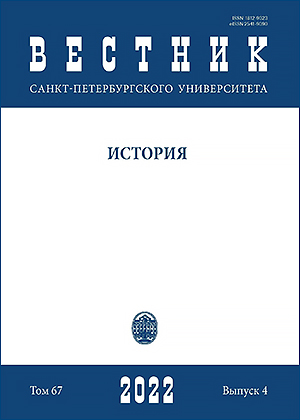The Issues of Alcohol Production and Abuse in Russia in Mikhail Katkov's Publications
DOI:
https://doi.org/10.21638/spbu02.2022.405Abstract
The article is devoted to the study of the evolution of views on the issues of alcohol production and abuse by the largest ideologue of Russian conservatism M. N. Katkov – editor-publisher of the newspaper “Moskovskie Vedomosti” and the magazine “Russkii Vestnik”. It analyses the speeches of the famous publicist and his associates on the pages of these publications aimed at alterations in the excise system, in force since 1863, in order to limit the excessive consumption of strong alcoholic beverages and overcome its severe social consequences. The reasons that prompted the famous publicist in the early 1880s to launch a campaign for the introduction of a wine monopoly are explained: the decline of the popularity of the liberal economic doctrine in the West as a result of the world economic crisis of 1873–1878; the rise of the movement in European countries for the transfer of the drinking trade to the treasury under the influence of stagnation in agriculture; the expansion of state intervention in economic life in Russia. The article points out the arguments given by Katkov in favor of a monopoly, which, in his opinion, had to allow regulating the distillery industry, ending rampant drunkenness, eradicating drunkenness and corruption in the beverage business. It is particularly noted that Katkov considered this reform one of the main points of his program for creating a “national” economy in Russia, protected from the West by high customs barriers and assuming multilateral participation of the state in the development of the national economy, and these attitudes largely corresponded to the protectionist course of the government in the reign of the penultimate Russian tsar, Alexander III.
Keywords:
drinking issue, excise system, wine monopoly, public thought, journalism
Downloads
References
Downloads
Published
How to Cite
Issue
Section
License
Articles of "Vestnik of Saint Petersburg University. History" are open access distributed under the terms of the License Agreement with Saint Petersburg State University, which permits to the authors unrestricted distribution and self-archiving free of charge.





